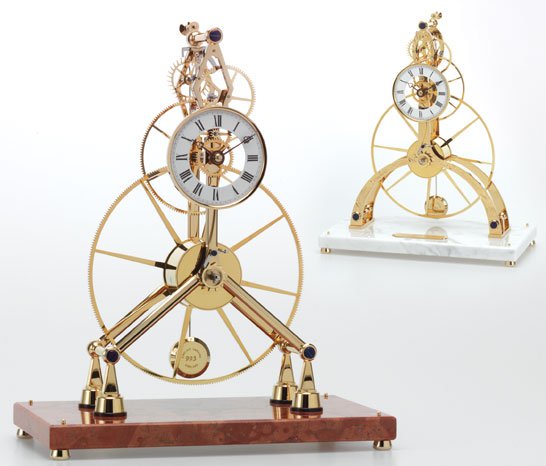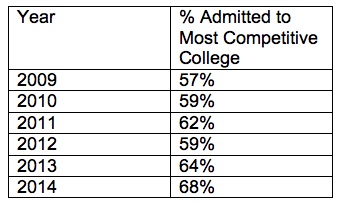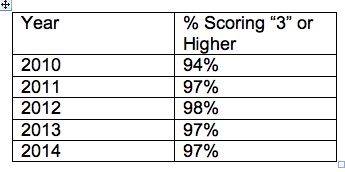Advanced Topics Succeeds and Expands: STEAM Curriculum in the Works
- Thursday, 11 June 2015 08:05
- Last Updated: Thursday, 11 June 2015 13:45
- Published: Thursday, 11 June 2015 08:05
- Melissa Hellman
- Hits: 7526
 Faculty study teams have deemed that the move to Advanced Topics at Scarsdale High School has been a success and are also working to develop a STEAM curriculum. Representatives from these two faculty teams presented updates on Scarsdale High School's Advanced Topics (AT) Program and STEAM (Science, Technology, Engineering, Arts, Math) curriculum development to the Board of Education at their work session on June 8, 2015. Scarsdale High School Principal Kenneth Bonamo introduced the meeting agenda by stating these areas are two important pieces of the high school curriculum and development goals and each has been assigned a faculty study team to evaluate program needs and successes and provide future direction.
Faculty study teams have deemed that the move to Advanced Topics at Scarsdale High School has been a success and are also working to develop a STEAM curriculum. Representatives from these two faculty teams presented updates on Scarsdale High School's Advanced Topics (AT) Program and STEAM (Science, Technology, Engineering, Arts, Math) curriculum development to the Board of Education at their work session on June 8, 2015. Scarsdale High School Principal Kenneth Bonamo introduced the meeting agenda by stating these areas are two important pieces of the high school curriculum and development goals and each has been assigned a faculty study team to evaluate program needs and successes and provide future direction.
Advanced Placement and Advanced Topics
It has been 8 years since the high school introduced Advanced Topics courses in lieu of traditional Advanced Placement (AP) courses. Some of the driving forces behind this initiative were to allow teachers to develop curriculum with more time for in depth inquiry -- without the pressure of having to rush through an agenda of topics in order to teach to the exam.
Math Teacher Monica Palekar and Social Studies Teacher Larry Brown led a study team in assessing "Where are we in the AT journey?" and presented their findings. They opened with a video of Scarsdale High School students talking about their experiences in AT classes. The common themes these students expressed were satisfaction with being in an environment where they could be intellectually challenged and engaged rather than memorizing facts to prepare for a test. The students appreciated how they developed problem-solving skills, worked independently and were able to ask for curriculum changes based on interest. They also mentioned passionate teachers with deep knowledge of their subject areas.
Palekar and Brown provided some background on how AT courses are developed using college level materials, assessments and syllabi. Some AT classes are even using college level textbooks. The teachers talked about efforts to address uniformity in curriculum and assessment across different sections of a class. There is a great deal of syllabus and exam sharing among the high school faculty and in some AT classes, such as chemistry, a uniform final exam is provided.
Two new AT courses will be introduced next year: International Politics and Spanish Literature and Culture.
One of the major concerns at the time of transitioning to AT was what impact, if any, this move have on the college admission success. Palekar and Brown presented a chart with data from the guidance department that showed the percent of students accepted at the "most competitive" (as per the Barron's Guide) colleges has continued to be strong:
Another concern about the implementation was how students who chose to take an AP test would be supported and how they would perform? Brown said that AT teachers make themselves available to students who want help preparing for the AP exams and he presented a graph showing the number of students scoring "3" or greater on the AP tests since 2010 has been consistently high:
 They closed their presentation by asking "What more can we do to continue to validate and confirm that this program is working?" Brown said the faculty concluded that they would like to get more qualitative and quantitative data from former AT students who are taking relevant college courses. He mentioned the possibility of surveys, perhaps followed by in-depth interviews with students with the goal of "making sure that we are providing high-order thinking skills and college ready content."
They closed their presentation by asking "What more can we do to continue to validate and confirm that this program is working?" Brown said the faculty concluded that they would like to get more qualitative and quantitative data from former AT students who are taking relevant college courses. He mentioned the possibility of surveys, perhaps followed by in-depth interviews with students with the goal of "making sure that we are providing high-order thinking skills and college ready content."
STEAM - Science, Technology, Engineering, Arts, Math
The floor was turned over to Science Teacher Jeremy Szerlip and Art Teacher Lisa Yokana for the STEAM portion of the presentation. They led a committee tasked with developing a course sequence in technology and engineering bearing in mind that SHS's own design lab is scheduled to open for the 2017/2018 school year. They began by looking at design labs in other schools and on college campuses and meeting with the people who run those labs. They also asked alumni who are studying engineering and computer science in college "How could we have better prepared you?"
Some common responses were:
- Provide more exposure to and overview of the field of engineering. What does it mean to be a civil engineer or a mechanical engineer or a chemical engineer?
- Offer opportunities to develop a more innovative mind set. In high school, projects were defined for them versus their college experience of having to be innovative and develop their own projects based on real needs.
- Supply hands-on "making" experiences.
- Provide exposure to tools and software commonly used by engineers.
Szerlip and Yokana presented some specifics about the envisioned course sequence. The introductory level will be a series of one-semester courses that meet twice a week. The first course will be Introduction to Design and Fabrication. This class will focus on tool use and safety, design thinking concepts, and documentation. The second introductory course will be Introduction to Engineering in which students will choose to build mini-projects such as a skeleton clock, a car that moves around a room and avoids objects, or a synthesizer. They hope to run prototypes of these classes in the fall and spring of the 2016/2017 school year.
The second level courses will be a selection of electives focused on different areas of engineering such as Computer Aided Design (CAD), Robotics, and Mechanical Engineering.
The third level will be an AT level class focused on design and entrepreneurship. Projects in this class will be generated by student's passions.
The work to get all of these courses established will begin this summer when the project team will focus on defining the introductory courses and associated projects, writing course descriptions and an explanation of the course sequence for the catalog. The team will also develop a job description for an Engineering Teacher who would hopefully be hired for the 2016/2017 school year.
In the fall and next spring (2015/2016), they will continue to define the projects for the introductory courses assisted by a group of twenty independent study students who will be prototyping potential projects and provide important feedback to the curriculum team.
Bonamo and all four of the teachers who presented at this meeting expressed tremendous gratitude to the many members of their project teams. Both Advanced Topics and STEAM are great examples of how the district's support for professional development of faculty leads to innovation and excitement in the classroom and is presenting many new opportunities to look forward to at Scarsdale High School in the near and not so far away future.
The full presentation can be seen here.







